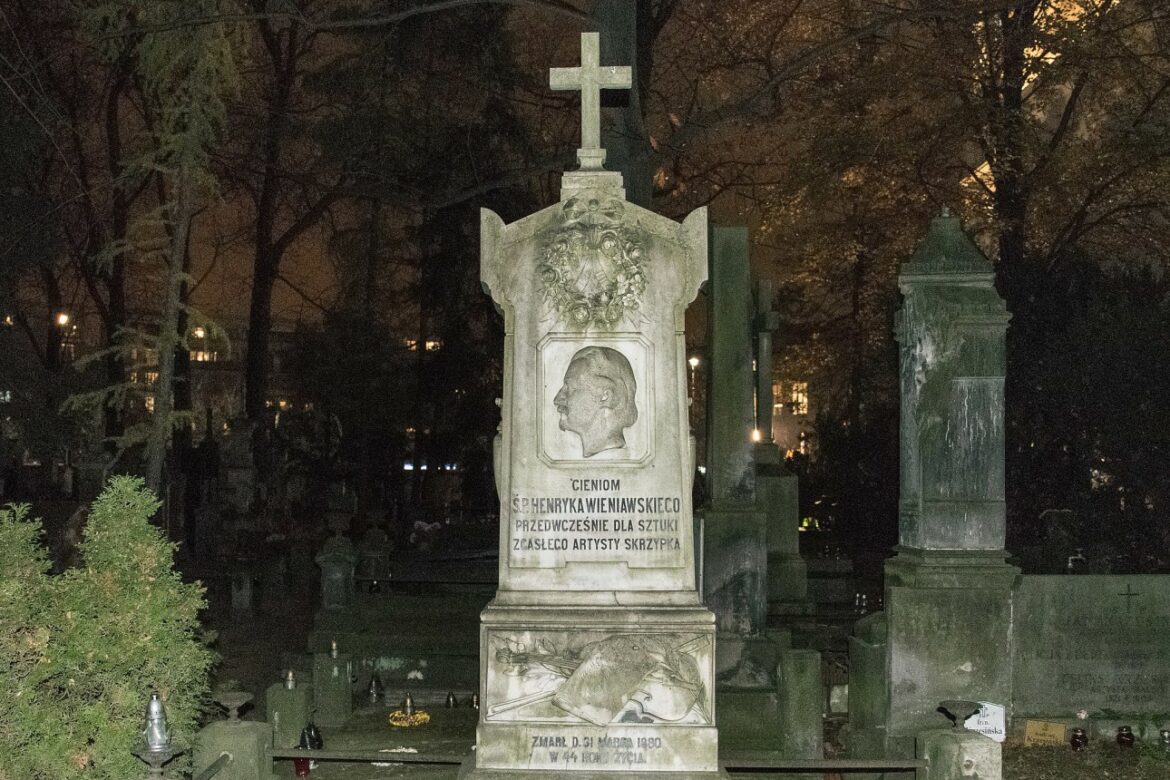Henryk Wieniawski, a violinist, virtuoso and composer, known as the “Polish Paganini”, is considered one of the most famous nineteenth-century musicians. He owed his fame to the talent and education he received from an early age, as well as the commitment of his mother, Regina née Wolff, and the diligence of his father, Tadeusz Napoleon Wieniawski.
The father of the future composer, T. N. Wieniawski, or actually Tobias Helman, came from a poor Jewish family and became one of the most famous doctors in the Kingdom of Poland under direct Russian rule. Thanks to his profitable profession, he was able to provide his children with education corresponding to the world standards of that time.
Tobias Helman was born in 1791 in Wieniawa, a Lublin suburb inhabited by Jews. His father, Herszek Majerewicz, was a barber. Young Tobias had to earn his education on his own. In middle school and later studying in Warsaw, he made a living by tutoring. Probably Stanisław Staszic helped him to find wealthy clients. Initially, Tobias planned a clerical job, but when that proved impossible, he decided to become a doctor.
He studied at the University of Warsaw, obtained a master’s degrees in medicine and surgery, as well as in philosophy. In 1828 he was baptized in the cathedral parish of St. John in Lublin, which meant taking new names. He also chose the new surname Wieniawski because of his place of birth. He ran a private practice, worked as a prison doctor, and was also a district doctor.
Wieniawski took part in the November Uprising, and after its fall, he accompanied the troops leaving for Prussia, providing them with medical care. For his achievements in this period, he was twice presented for decoration with the Virtuti Militari Cross.
Under the amnesty in 1832, he returned to Lublin, where he worked in an institution for the mentally ill and founded St. Joseph hospital for infectious diseases, he also performed official administrative functions as a doctor. He also published in “Medical Weekly”. Awarded for “15 years of impeccable service”, Wieniawski became entitled to apply to the Government Commission of the Kingdom of Poland for hereditary nobility (passing further in the male line). However, his request was rejected.
He was married twice. The first wife, the mother of doctor Tadeusz Wieniawski, came from an assimilated Jewish family. The second, Regina nee Wolff, was the daughter of a Warsaw doctor. One of her brothers was a pianist, the other a composer. Tadeusz and Regina had seven sons, three of whom died in early childhood.
Henryk, the future violin virtuoso, was born on July 10, 1835 in Lublin. The Wieniawski family owned a tenement house at the Market Square, and at one time they also lived in Krakowskie Przedmieście. As one of the Wieniawski brothers recalled, the father was a rare guest at home, he had a rather difficult character, and for this reason the upbringing of the children became almost the exclusive task of their mother. Under her influence Henryk’s musical talent began to quickly form. He was given his first violin lessons by Lublin teachers, but at the age of eight he received a state scholarship and went to study in Paris. He graduated from the conservatory at the age of 11 and was the best graduate of that year.
Henryk Wieniawski was touring a lot. As a young musician, he performed in Paris, Helsinki, Rewel (Tallinn), Dorpat (Tartu), Riga, Dresden, Berlin, Hamburg, Vienna. He became a favorite of the public in St. Petersburg. As a renowned musician, he has given concerts in the United States, Canada, Mexico and Cuba, and toured an impressive number of 215 concerts in eight months. Contemporaries joked that he was the second incarnation of Niccolò Paganini.
Henryk also remembered about the Polish audience, he performed in Warsaw and Poznań, where he gave concerts with his brother Józef, a piano player. The brothers’ stays in Poznań between 1854 and 1878 became an opportunity to manifest the patriotic feelings of the inhabitants, then in the Prussian partition. The Wieniawski family are still remembered by the inhabitants of Poznań. The Henryk Wieniawski Music Society in Poznań has been organizing the International Violin Competition in his name since 1935. The brothers are also commemorated by a plaque on the building of the Poznań Bazaar.
In 1876, Henryk Wieniawski was diagnosed with heart disease. At that time, he concentrated on teaching at the conservatory in Brussels and composing. He had composed many pieces earlier, also in his childhood. There were opinions that the first pieces that delighted the St. Petersburg’s audience were not his own work, but were created in collaboration with Parisian musicians. It was claimed that they corrected Henryk’s works at the behest of his mother, who accompanied her sons to France. These questions are unsettled until today, but it is certain that Regina Wieniawska’s presence in Paris was very beneficial for the artistic development of children. While running an open house, Mrs. Wieniawska introduced her sons to famous French musicians, as well as to Poles in the Great Emigration, including Adam Mickiewicz. Henryk also had the opportunity to meet Fryderyk Chopin.
Wieniawski married in 1860 an English girl, Isabella Hampton, whom he had met in Paris a year earlier. Her father was initially reluctant to his daughter’s marriage with the artist but there was a rumor that he changed his mind after hearing Legend composed for her by her future husband. The couple had five children.
Henryk Wieniawski died in 1880 in a Moscow hospital where he treated a heart disease.





